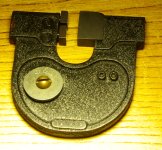eventhorizons
Plastic
- Joined
- Jun 27, 2022
I want to have a custom gauge made that is much like those circular sheet metal thickness gauges you find all over the place. Like the one pictured.
They are precisely made out of tough materials but can be purchased for as little as $10! I'm not aiming for that low of a price but it's got to be reasonable!
What is the manufacturing technique that is used to make these items? Are those really narrow slots cut with slitting saws?
Wire EDM would be good for prototypes or small quantities, but I would think that would not scale well.
I apologize if I'm being dense but I have been pondering this and have not come up with a good answer. Thanks in advance!

They are precisely made out of tough materials but can be purchased for as little as $10! I'm not aiming for that low of a price but it's got to be reasonable!
What is the manufacturing technique that is used to make these items? Are those really narrow slots cut with slitting saws?
Wire EDM would be good for prototypes or small quantities, but I would think that would not scale well.
I apologize if I'm being dense but I have been pondering this and have not come up with a good answer. Thanks in advance!




